What Does a Bull Symbolize Spiritually? Strength, Fertility!
The bull is a powerful spiritual symbol representing strength, fertility, determination, and stubbornness. In various cultures, the bull is seen as a sacred creature embodying the attributes of valor, provision, and virility.
Spiritually, the bull often signifies a call to face challenges with courage and to embrace the abundance of life.
In spirituality, the bull stands for several key concepts:
Cultural examples include the worship of the Bull in Ancient Egyptian religion as Apis, the significance of the Nandi bull in Hinduism as the vehicle of Lord Shiva, and the Cretan Bull from Greek mythology symbolizing the might and the audacity.
The spiritual symbolism of the bull encourages individuals to harness their inner strength to overcome life’s obstacles and to live abundantly with resilience and prosperity.
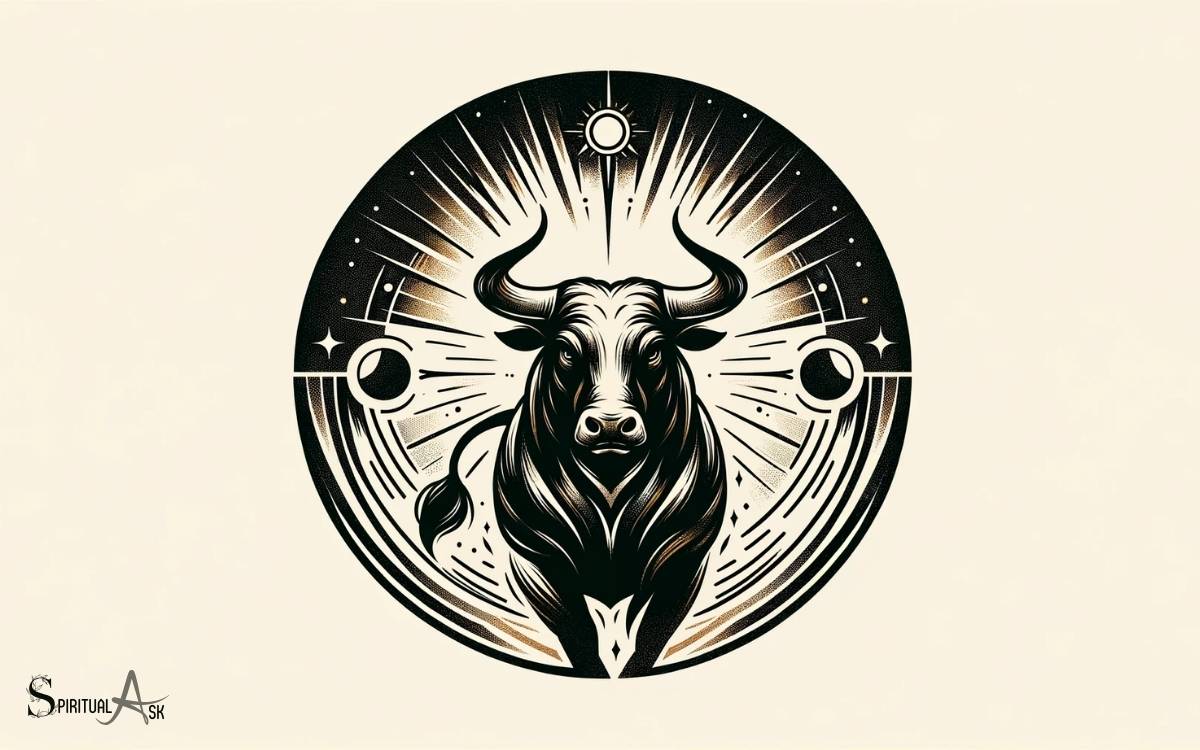
Key Takeaway
Historical and Cultural Significance
As I explore the historical and cultural significance of the bull as a spiritual symbol, it becomes evident that its representation dates back to ancient civilizations across the world.
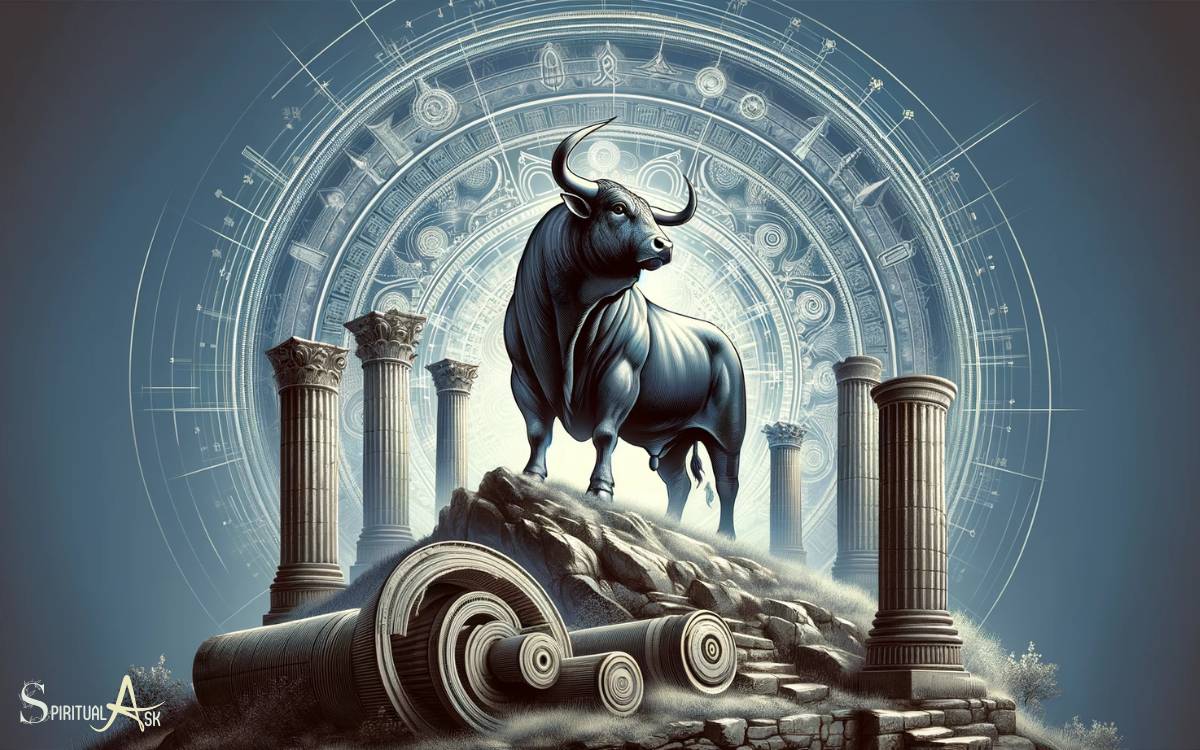
The bull has been revered as a symbol of strength, fertility, and power in various cultures, including ancient Mesopotamia, Egypt, Greece, and Mesoamerica.
In these societies, the bull was often associated with deities and played a central role in religious rituals and beliefs. Its presence in art, mythology, and religious ceremonies underscores its spiritual importance and enduring symbolism.
The bull’s significance as a spiritual symbol reflects the deep connection between humans and the natural world, as well as the universal themes of strength, vitality, and abundance that it embodies.
Strength and Power Symbolism
One significant aspect of the bull’s spiritual symbolism is its portrayal of unyielding strength and commanding power. The bull embodies a sense of raw physical power and resilience, representing the ability to overcome challenges with sheer force.

In many cultures, the bull is revered for its robust and unwavering nature, symbolizing the strength needed to endure life’s trials.
This symbolism extends to the spiritual realm, where the bull is often associated with inner strength, determination, and the fortitude to face adversity.
The bull’s power also signifies a commanding presence, asserting authority and leadership. It serves as a reminder to harness our own inner strength and to wield power responsibly, using it to protect and uplift others.
The bull’s representation of strength and power encourages us to tap into our personal reserves of resilience and influence with integrity.
Fertility and Abundance Associations
So, when it comes to the spiritual symbolism of a bull, the aspect of fertility and abundance is quite significant.
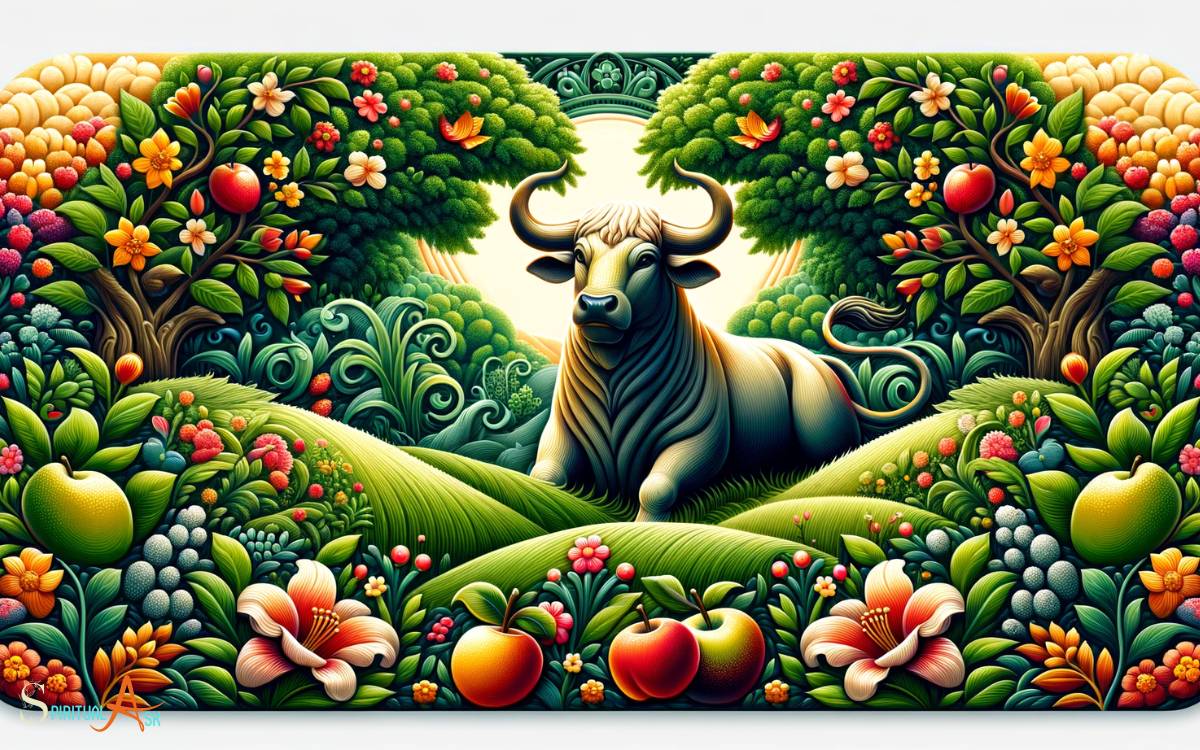
Many cultures throughout history have associated the bull with fertility and the ability to multiply. This ties into the symbolism of a bountiful harvest and the abundance that the bull represents in various spiritual traditions.
Fertility Symbol in Cultures
In my research, I’ve found that bulls symbolize fertility and abundance in many cultures around the world.
This symbolism is deeply rooted in the agricultural societies of the past and continues to hold significance today.
Here are some interesting associations of bulls with fertility and abundance in various cultures:
Ancient Mesopotamia:
- Bulls were associated with the god of fertility and vegetation, Tammuz.
- They were revered for their role in ensuring the fertility of the land and the success of harvests.
Hinduism:
- The bull, Nandi, is the sacred vehicle and gatekeeper of Lord Shiva.
- It symbolizes fertility, strength, and abundance, and is honored in many Hindu rituals and ceremonies.
Minoan Civilization:
- Bulls were central to religious rituals and were depicted in art symbolizing fertility and prosperity.
Connection to Harvest Symbolism
As a symbol of fertility and abundance, the bull’s connection to harvest symbolism is evident in various cultural traditions and religious practices.
In many ancient agricultural societies, the bull represented the vital force of fertility and the abundance of the harvest.
The bull’s strength and virility were often associated with the earth’s ability to produce crops and sustain life.
For example, in Hinduism, the bull is linked to Nandi, the sacred vehicle of Lord Shiva, signifying fertility and strength.
Similarly, in ancient Greek and Roman cultures, the bull was associated with agricultural deities like Demeter and Ceres, symbolizing the bountiful harvest.
This connection to harvest symbolism highlights the bull’s role as a powerful spiritual emblem of fertility and abundance in various cultural contexts.
Bull Symbolism in Mythology
Growing up, mythology often portrayed the bull as a symbol of strength, fertility, and power.
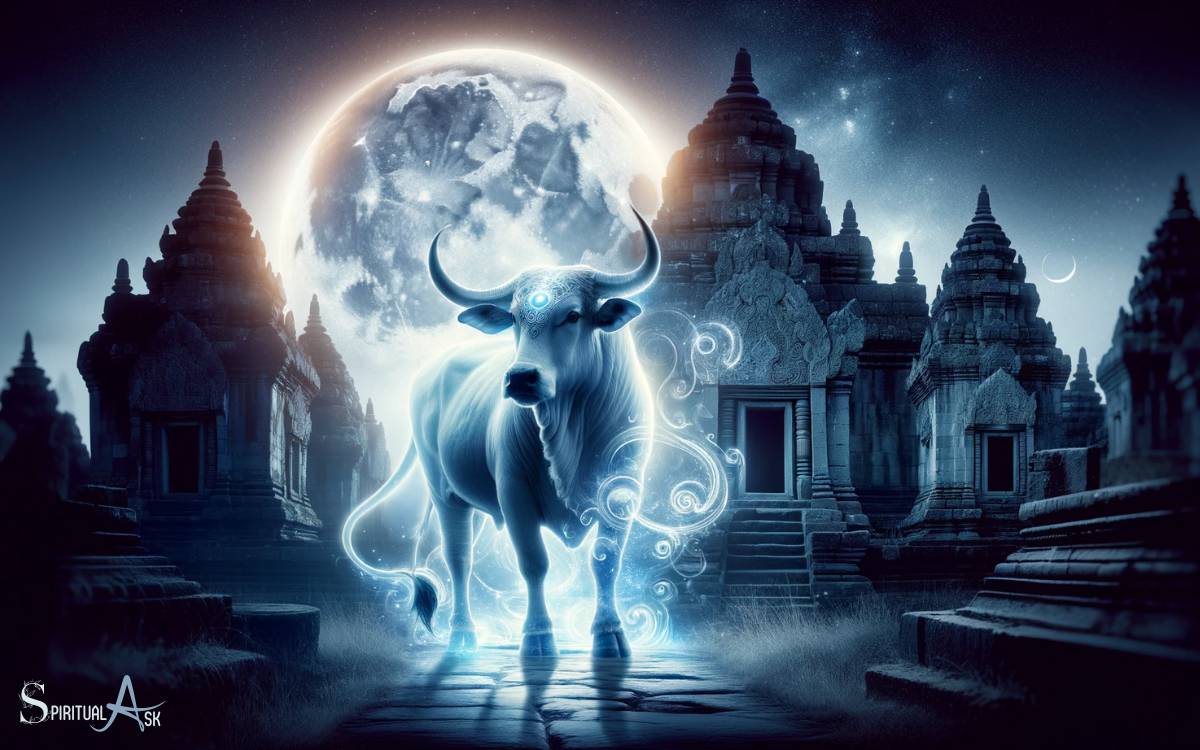
In various mythological traditions, the bull symbolizes different aspects and holds diverse meanings:
- Sacrifice and Creation: In many ancient cultures, bulls were offered as sacrifices to the gods, symbolizing both the giver and sustainer of life.
- Divine Power and Deities: Bulls were often associated with deities, embodying their strength and virility. For instance, in Greek mythology, the god Zeus transformed into a magnificent white bull to win the affection of Europa.
- Underworld and Regeneration: In some mythologies, the bull represents the underworld and the cycle of death and rebirth, signifying regeneration and renewal.
These diverse interpretations highlight the pervasive symbolism of the bull across various mythological beliefs and traditions.
Spiritual Lessons From Bull Imagery

Through my spiritual journey, I have learned valuable lessons from the powerful imagery of the bull.
The bull represents strength, determination, and fertility, teaching us to embrace these qualities in our spiritual lives.
Below is a table illustrating the spiritual lessons we can learn from bull imagery:
| Spiritual Lesson | Explanation |
|---|---|
| Strength | Like the bull, we must harness our inner strength to overcome life’s challenges. |
| Determination | The bull’s unwavering nature teaches us to persevere in the face of adversity. |
| Fertility | Symbolizing abundance, the bull encourages us to cultivate growth in all aspects of our lives. |
| Leadership | Just as the bull leads the herd, we are reminded to guide and protect those around us. |
Embracing these spiritual lessons from bull imagery can lead to personal growth and a deeper connection to our spiritual path.
Bull Symbolism in Different Religions
In my exploration of bull symbolism, I find significance in its representation across various religions.
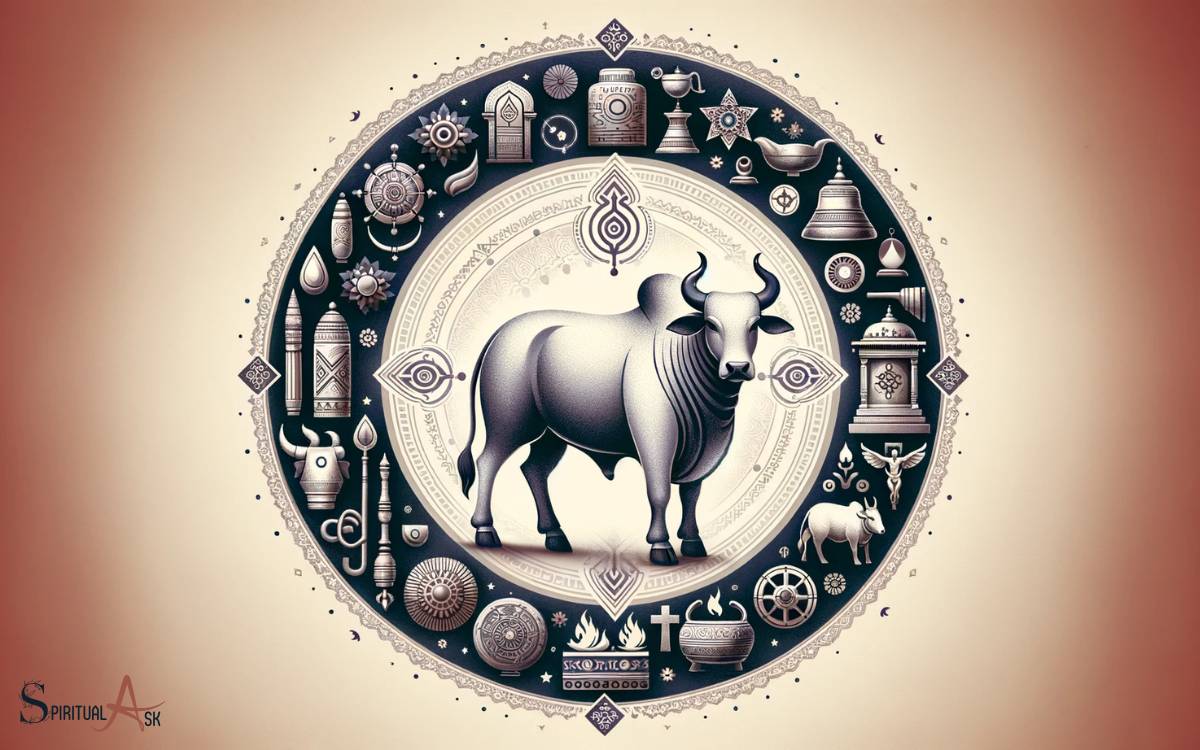
The bull holds diverse symbolic meanings, each contributing to the spiritual tapestry of different faiths:
- Hinduism: The bull Nandi is the mount of the god Shiva, symbolizing strength, virility, and fertility. Nandi is also revered as a symbol of selfless devotion and righteousness.
- Ancient Near East: The bull was often associated with deities of fertility and storm, representing power and abundance. It was also linked to kingship and authority.
- Mithraism: Popular in the Roman Empire, featured the slaying of a bull as a central motif, symbolizing the triumph of good over evil and the renewal of life.
The bull’s presence in these religions illustrates its enduring spiritual significance and universal symbolism.
The Bull as a Sacred Animal
I revere the bull as a sacred animal in various cultures due to its association with strength, fertility, and divine power.

In Hinduism, the bull Nandi is considered the mount and gana (follower) of the god Shiva, symbolizing strength and virility.
In ancient Mesopotamian cultures, the bull was associated with the storm god Adad, representing power and fertility.
The Minoan civilization worshipped the bull as a sacred animal, as depicted in their intricate artwork and religious ceremonies.
Additionally, in ancient Egypt, the bull was linked to the god Apis, embodying strength and divine kingship.
The significance of the bull as a sacred animal transcends geographical and cultural boundaries, embodying qualities that are universally revered and valued.
Its symbolism as a revered and sacred creature continues to resonate across different belief systems and traditions.
Interpretations of Bull Symbolism
So, what do bulls symbolize spiritually? Let’s start by exploring the interpretations of bull symbolism.
We’ll look at how bulls represent strength and power, as well as their association with sacrifice and abundance.

Strength and Power Symbolism
Amidst spiritual symbolism, the bull embodies both physical and inner strength, representing power and resilience in various cultures and traditions.
The symbolism of strength and power associated with the bull carries deep spiritual significance:
- Physical Strength: The bull’s muscular build and robust stature symbolize physical power and vitality. It embodies the idea of robustness and vigor, often associated with the ability to overcome challenges and obstacles.
- Inner Resilience: Beyond its physicality, the bull represents inner resilience and emotional strength. Its unwavering nature signifies the ability to endure hardships and remain steadfast in the face of adversity.
- Dominance and Authority: In many spiritual contexts, the bull is a symbol of dominance and authority, signifying leadership, assertiveness, and the ability to command respect.
The bull’s symbolism of strength and power resonates deeply, offering insights into fortitude and determination within spiritual contexts. In many ancient cultures, the bull symbolized fertility and abundance, representing the Earth’s natural cycles and the vital connection between humans and nature. Its sheer physical presence evokes a sense of groundedness and unwavering resilience, making it a revered symbol in many spiritual traditions. Similarly, the spiritual symbolism of cardinal, with its vibrant red plumage, often represents passion, vitality, and a reminder of the presence of loved ones who have passed on. This connection to the spiritual realm adds depth to the bull’s symbolism, embodying a powerful force that transcends the physical world.
Sacrifice and Abundance Symbolism
Frequently, the symbolism of the bull extends to themes of sacrifice and abundance, encompassing profound spiritual meanings across various cultures and belief systems.
The bull’s association with sacrifice is often rooted in the idea of offering something valuable for a higher purpose or divine connection.
In many spiritual traditions, the bull represents the willingness to give up something of great importance for the benefit of others or spiritual growth. This act of sacrifice is seen as a powerful symbol of selflessness and devotion.
Additionally, the bull is also a symbol of abundance, often representing fertility, prosperity, and the earth’s bountiful gifts. It embodies the idea of sustenance, material wealth, and the plentiful blessings of the natural world.
Through these dual symbols, the bull holds deep spiritual significance, inspiring reverence and contemplation.
Conclusion
So, the next time you see a bull, remember that it’s not just a mere animal, but a powerful symbol with deep spiritual significance. Some may argue that bull symbolism is outdated, but its lessons of strength, fertility, and sacredness are timeless.
Whether you believe in the spiritual aspects or not, there’s no denying the enduring impact of the bull symbol in cultures and religions around the world.






